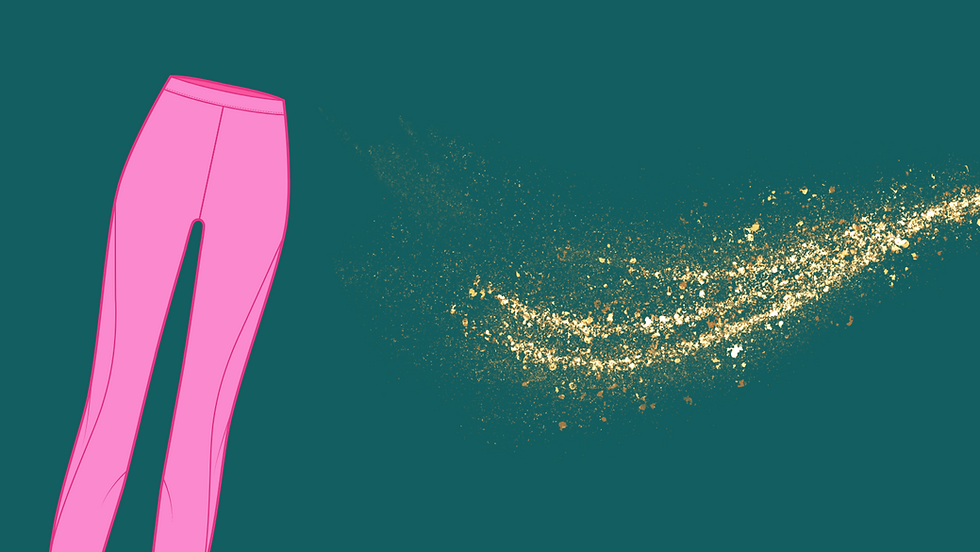Leggings, Resparkling & Other Adventures in Practice Psychology
- Sep 26, 2024
- 4 min read
Updated: Sep 29, 2024

I’m knee-deep in research for my book.
I continue to be awestruck by psychology concepts. Yes, they help me practice, but my life in general is benefiting in ways I didn’t expect.
I thought I would share a few ideas that have had a particular impact on me.
Let’s start with a human tendency regarding decision-making referred to as Fredkin’s Paradox: the more equally attractive two choices are, the harder it can be to choose between them. And if we’re not careful, I would add, the longer it takes to choose between them.
The day before, I had gotten stuck choosing between two pairs of leggings on Amazon. Ah, this is what Fredkin was talking about, I realized. By the time Fredkin’s paradox had set in, I had ruled out all the bad choices (non-cotton, not great for hours of writing) and was down to the final two. That’s when I descended into the time-wasting rabbit hole, reading all the reviews, combing through size charts, and looking at all the pictures.
Big. Waste. Of. Time. I mean, for leggings? It’s not like I was picking out a new violin.
Fredkin’s Paradox is a way of overthinking and over optimizing, which uhm, I don’t need any extra help with.
Ever since I learned about it, I’ve been trying to make the decision between two equally good things as quickly as possible, even with a coin toss if necessary. Now I have more time for writing.
Once I knew about Fredkin’s Paradox, it seemed to pop up everywhere. This is, in itself, another cognitive distortion, called the frequency fallacy. You’ve experienced it many times, I bet: It’s when we learn about something new and then have the feeling it’s suddenly all around us. I started noticing Fredkin’s paradox in other people’s behavior daily, for example. In my playing: once somebody pointed out that leading tones could be higher, I heard that everywhere, too, in my own playing and in the playing of others. In reality, everything was as it had always been, but my perception of the world had changed. I was noticing differently.
One of the psychological concepts that has ended up being a central theme in my book is that of habituation and dishabituation.
Essentially, whenever things repeat in our life, we become a tiny bit more habituated, and the brain’s chemical reaction lessens over time. It’s true for the good and bad in our lives.
When we habituate to the good, music-making itself may lose its shiny, inspirational quality over time. Discoveries in practice, or the darkness of Shostakovich’ music, lose their sparkle. Something you once couldn't get enough of can turn into another checkbox on your to-do list.
When we habituate to the bad, on the other hand, we tend to accept things that are less than ideal. Our motivation to change lessens. Habituation to what is bad can lead us to accept a faulty technical setup or a ho-hum relationship with practice. We get used to less-than-stellar results and often don’t even think there’s much we can change.
Using the concept of habituation and dishabituation purposely holds great promise in practice. When things lose their luster, we would be well advised to “resparkle”, in the words of Tali Sharot, who co-wrote a whole book on the subject.
Resparkling means to change something, to purposely dishabituate. For the purposes of music: dive into a new piece, take a lesson with someone new, practice in a completely different order, experiment with new equipment, etc. Inspiration and newness go together. It’s not just for feel-good moments, however, it turns out the brain also learns better when we change things up; it notices better, and it makes new neural connections in the brain. So, invert your intervals, practice backward, dive into unknown and messy practice…you know, resparkle.
When we are trying to build practice consistency, on the other hand, we should purposely habituate. Keeping things the same helps to lessen our reactivity (I-don’t-wanna feelings for lack of a better description) when we are trying to build a solid habit. Convince yourself to practice around the same time of day, and your resistance to practice will lessen over time, as your brain says yeah, I know what we are doing now, now big deal. It’s working for me and my octaves “problem”: I hate to practice octaves, and I suck at them (I’m not sure what’s first here, the chicken or the egg). I’ve decided to practice them a little bit every day, right after I warm up. My octaves are improving (I think ???), and what I can say for sure is that my internal catastrophizing around octaves has lessened. It’s become just another tiny activity in my routine, like tuning. No big deal. Like habituating to making decisions quickly when two things are almost the same anyway.
I’m curious what you might discover if you apply the concept of purposeful habituation/dishabituation in your own musical life. Send me a line and let me know! If you want to learn more about this habituation/dishabituation stuff, listen to Tali Sharot’s interview on the Hidden Brain Podcast.





